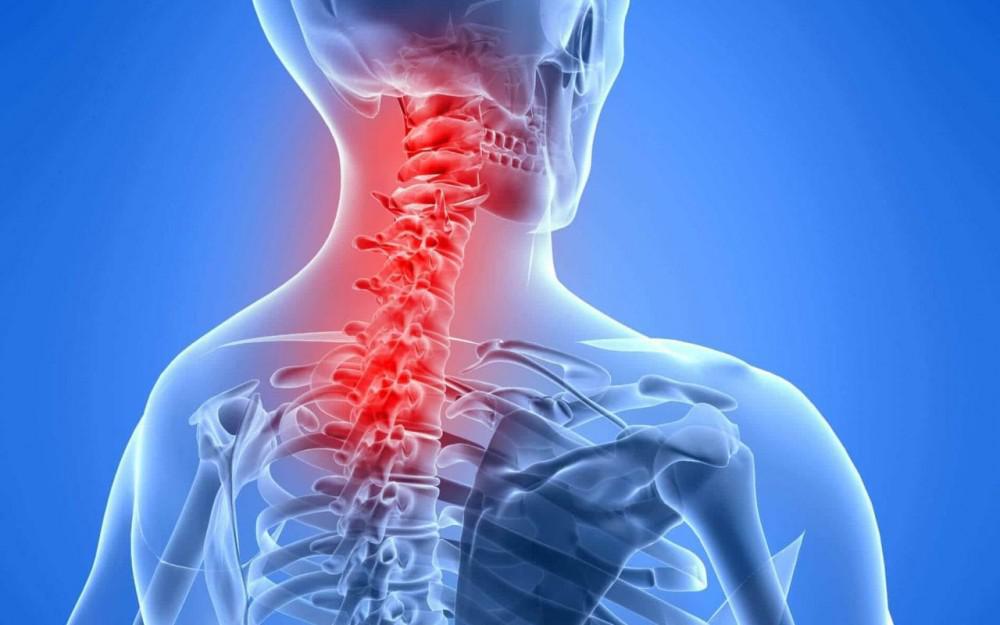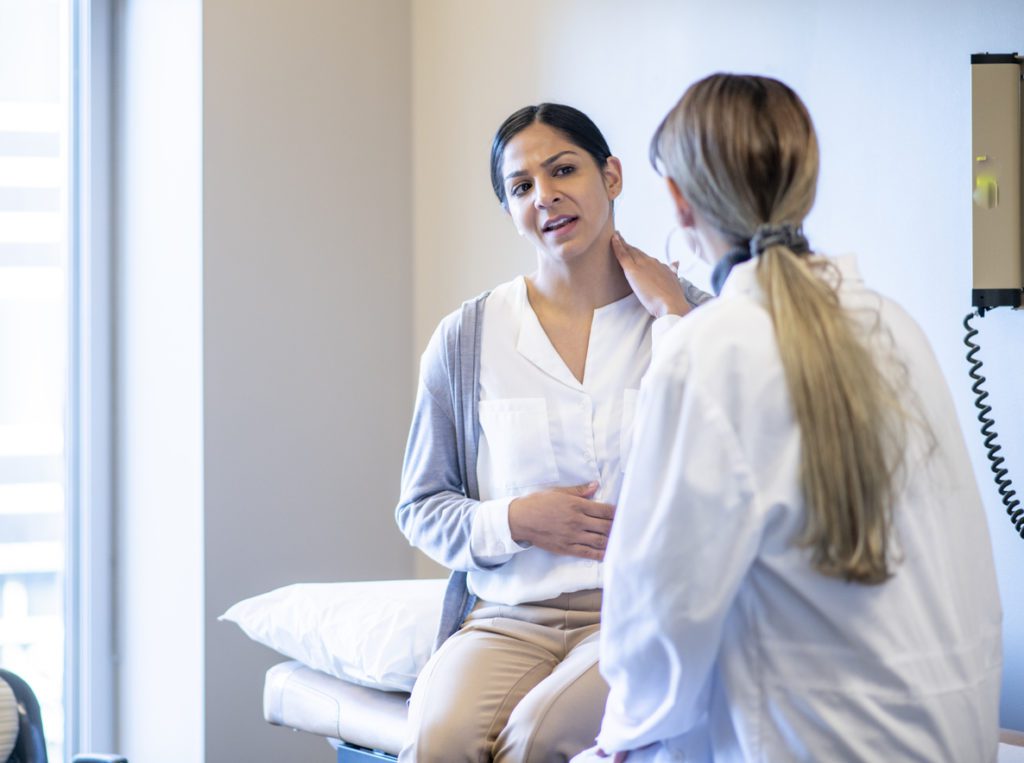What is Neck pain?

The vertebrae in your neck extend from your skull to your upper torso. Cervical discs cushion the joints between the vertebrae, reducing the risk of injury.
Your neck is made up of bones, ligaments, and muscles that keep your head in place and allow it to move. Inflammation, abnormalities, and injuries to the neck can all lead to stiffness and pain. It’s not uncommon for people to suffer pain in the neck or stiffness. If you’re having problems, it’s probably due to your sleeping position. Whiplash, a fall, or a contact sports injury can all result in neck pain.
Neck pain is usually not a life-threatening condition and can be alleviated within a few days of its onset. However, neck pain can be a sign of a more serious injury or illness that necessitates a visit to the doctor. Take immediate action if you’re experiencing neck pain that lasts more than a week and is severe or accompanied by other symptoms.
Neck Pain Symptoms

The severity and duration of neck pain symptoms can vary widely. Often, neck pain is short-lived and only lasts a few days or a few weeks. It can also become chronic in some cases. Neck pain can be mild and have little impact on your day-to-day activities, or it can be severe and leave you unable to function.
Symptoms of neck pain may include:
- Stiff neck – A stiff upper body. Having a “stiff” or “stuck” neck is a common complaint among those who suffer from neck pain. The range of motion in the neck can be limited by pain.
- Sharp pain – A sharp stabbing sensation. A “stabbing” or “sharp” pain in the neck is a common symptom.
- Pain when moving – Moving causes me pain. Moving, twisting, or extending your cervical spine, either from side to side or up and down, can exacerbate your neck pain.
- Radiating pain or numbness – Numbness or pain that radiates. As a result, your neck pain may spread to other parts of your body such as your head and arms. Your arms or hands may tingle, feel numb, or be weak if you have neck pain caused by nerve compression. A pinched nerve in the neck can cause a burning or sharp pain that radiates down the arm and into the shoulder. If you experience this symptom, make an appointment with your doctor right away.
- Headache – Cervicogenic headaches are headaches that originate in the neck. Migraine headaches can cause pain in the neck, as well as a headache.
- Pain when palpated – It hurts to be touched. Palpation of the cervical spine can exacerbate the symptoms of neck pain (physically examined).
Causes of Neck Pain

There are numerous possible causes of stiffness or pain in the neck.
Muscle tension and strain
This is usually from activities and behaviors such as:
- poor posture
- working at a desk for too long without changing position
- sleeping with your neck in a bad position
- jerking your neck during exercise
Injury
It is especially vulnerable to neck injuries when the muscles and ligaments of the neck are forced to move outside of their normal range, such as in falls, car accidents, and sporting events.
The spinal cord may also be damaged if the neck bones (cervical vertebrae) are fractured. Whiplash is a common term for a neck injury caused by a sudden jerking of the head.
Heart attack
It is possible that neck pain could be a sign of a heart attack. Other symptoms of a heart attack, such as chest pain, may accompany it.
- shortness of breath
- sweating
- nausea
- vomiting
- arm or jaw pain
You should seek medical attention right away if your neck hurts and you have any other signs of a heart attack.
Meningitis
One of the most common causes of meningitis is a bacterial infection of the membranes that surround the brain and spinal cord. Meningococcal meningitis is characterized by the following symptoms:
- stiff neck
- headache
- nausea
- vomiting
- sensitivity to light
- fever
Meningitis is a medical emergency that can be deadly. Consult a physician right away if you suspect meningitis.
Other causes
Other causes of neck pain include the following:
Pain, joint swelling, and bone spurs are all symptoms of rheumatoid arthritis. Neck pain is a possibility if they occur in the neck region.
Osteoporosis weakens bones and increases the risk of fractures, even if they are only minor. Although this condition is most commonly found in the hands or knees, it can also be found in the neck at some point.
In addition to pain in the neck and shoulders, fibromyalgia affects the rest of the body.
Cervical disc degeneration can occur with age. Osteoarthritis of the neck is known as spondylosis. This may result in the vertebral canal becoming smaller. Your joints will be put under more strain as a result of this as well.
When a disc bulges out due to trauma or injury, the spinal cord and/or nerve roots may be put under additional stress. Herniated cervical disc, rupture, or slip is the medical term for this condition.
There are many different types of spinal stenosis, but the most common is spinal stenosis in which the spinal column becomes progressively narrower. Arthritis or other chronic inflammation may be to blame for this symptom.
In rare instances, neck stiffness or pain occurs due to:
- congenital abnormalities
- infections
- abscesses
- tumors
- cancer of the spine
When to see your doctor
Consult a physician if symptoms persist for longer than a week. Consult a medical professional if you experience any of the following symptoms:
- severe neck pain without apparent cause
- a lump in your neck
- fever
- headache
- swollen glands
- nausea
- vomiting
- trouble swallowing or breathing
- weakness
- numbness
- tingling
- pain that radiates down your arms or legs
- inability to move your arms or hands
- inability to touch your chin to your chest
- bladder or bowel dysfunction
Medical attention should be sought immediately if you’ve been injured in an accident or fall and your neck hurts.
How Neck Pain is Treated

A doctor will conduct a physical examination and gather all of your medical information. Make sure you’re prepared to go into detail about your symptoms. All prescription and over-the-counter (OTC) medications and supplements you’ve been taking should also be brought up with your doctor.
Any recent injuries or accidents, regardless of how unrelated they seem at first glance, should be brought up with your doctor during your visit.
Neck pain treatment is based on the underlying cause. There are many imaging studies and tests that can help your doctor determine the cause of your neck pain and make a diagnosis, including a thorough history and physical exam.
- blood test
- X-ray
- CT scan
- MRI scan
- electromyography, which allows your doctor to check the health of your muscles and the nerves that control your muscles
- lumbar puncture (spinal tap)
Your doctor may suggest that you see a specialist based on the results of the test. There are a number of options for treating neck pain, including:
- ice and heat therapy
- exercise, stretching, and physical therapy
- pain medication
- corticosteroid injections
- muscle relaxants
- neck collar
- traction
- antibiotics if you have an infection
- hospital treatment, if a condition such as meningitis or heart attack is the cause
- surgery, which is rarely necessary
Alternative therapies include:
- acupuncture
- chiropractic treatment
- massage
- transcutaneous electrical nerve stimulation (TENS)
These methods should only be used by licensed professionals.
Howto ease neck pain at home
You can alleviate minor neck pain and stiffness by following these simple steps:
- For the first few days, use ice. After that, use a heating pad, hot compress, or a hot shower to help relieve the pain and swelling.
- Take a few days off from sports, activities that exacerbate your symptoms, or heavy lifting. As your symptoms subside, gradually return to normal activity.
- A neck brace or collar should only be used with a doctor’s permission. It is possible to make your symptoms worse if you do not use them correctly.
- Take OTC pain relievers, such as ibuprofen or acetaminophen.
- Exercise your neck every day. Slowly stretch your head in side-to-side and up-and-down motions.
- Practice good posture.
- Avoid cradling the phone between your neck and shoulder.
- Change your position often. Don’t stand or sit in one position for too long.
- Get a gentle neck massage.
- Use a special neck pillow for sleeping.
What’s the outlook for people with neck pain?
Neck pain is a common ailment brought on by poor posture and overworked muscles. Good posture and rest for sore neck muscles should alleviate your discomfort in these situations.
If home remedies for neck pain don’t help, make an appointment with your doctor.




